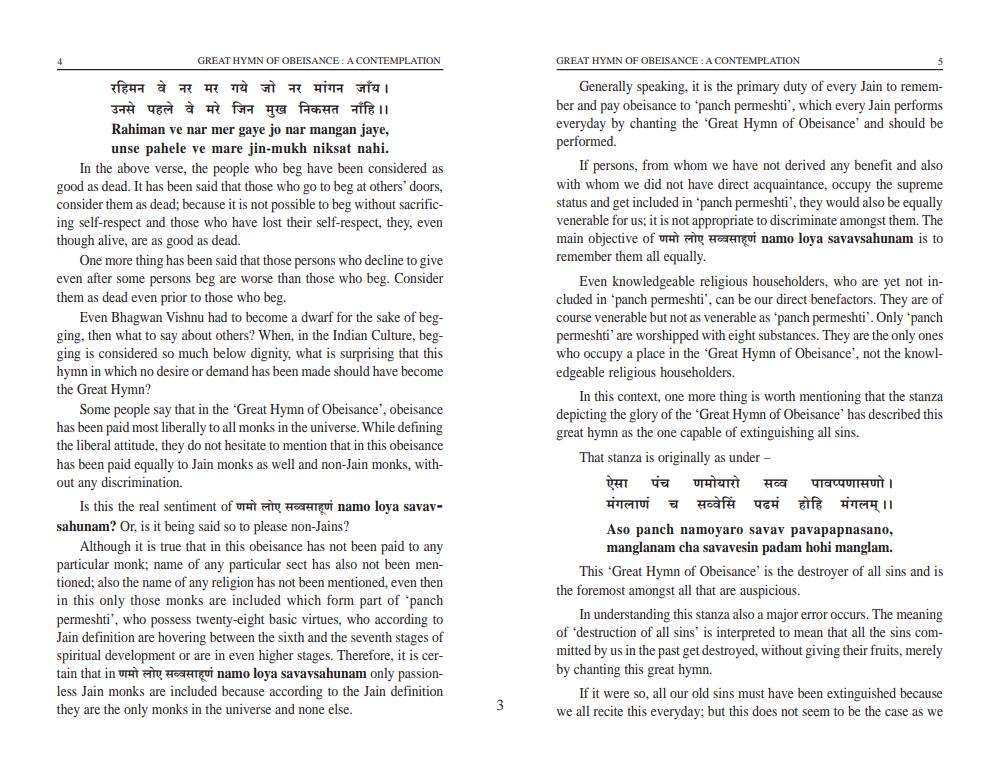Book Title: Namokar Mahamantra Ek Anushilan Author(s): Hukamchand Bharilla Publisher: Todarmal Granthamala Jaipur View full book textPage 4
________________ GREAT HYMN OF OBEISANCE: A CONTEMPLATION GREAT HYMN OF OBEISANCE: A CONTEMPLATION रहिमन वे नर मर गये जो नर मांगन जाँय। उनसे पहले वे मरे जिन मुख निकसत नाहि ।। Rahiman ve nar mer gaye jo nar mangan jaye, unse pahele ve mare jin-mukh niksat nahi. In the above verse, the people who beg have been considered as good as dead. It has been said that those who go to beg at others' doors, consider them as dead; because it is not possible to beg without sacrificing self-respect and those who have lost their self-respect, they, even though alive, are as good as dead. One more thing has been said that those persons who decline to give even after some persons beg are worse than those who beg. Consider them as dead even prior to those who beg. Even Bhagwan Vishnu had to become a dwarf for the sake of begging, then what to say about others? When, in the Indian Culture, begging is considered so much below dignity, what is surprising that this hymn in which no desire or demand has been made should have become the Great Hymn? Some people say that in the "Great Hymn of Obeisance', obeisance has been paid most liberally to all monks in the universe. While defining the liberal attitude, they do not hesitate to mention that in this obeisance has been paid equally to Jain monks as well and non-Jain monks, without any discrimination. Is this the real sentiment of UHT TU HOAHUI namo loya savaysahunam? Or is it being said so to please non-Jains? Although it is true that in this obeisance has not been paid to any particular monk; name of any particular sect has also not been mentioned; also the name of any religion has not been mentioned, even then in this only those monks are included which form part of 'panch permeshti', who possess twenty-eight basic virtues, who according to Jain definition are hovering between the sixth and the seventh stages of spiritual development or are in even higher stages. Therefore, it is certain that in UHT TO HAHIEU namo loya savavsahunam only passionless Jain monks are included because according to the Jain definition they are the only monks in the universe and none else. Generally speaking, it is the primary duty of every Jain to remember and pay obeisance to 'panch permeshti', which every Jain performs everyday by chanting the 'Great Hymn of Obeisance and should be performed If persons, from whom we have not derived any benefit and also with whom we did not have direct acquaintance, occupy the supreme status and get included in 'panch permeshti', they would also be equally venerable for us, it is not appropriate to discriminate amongst them. The main objective of UT IT HAHIEU namo loya savavsahunam is to remember them all equally. Even knowledgeable religious householders, who are yet not included in panch permeshti', can be our direct benefactors. They are of course venerable but not as venerable as panch permeshti'. Only panch permeshti' are worshipped with eight substances. They are the only ones who occupy a place in the "Great Hymn of Obeisance', not the knowledgeable religious householders. In this context, one more thing is worth mentioning that the stanza depicting the glory of the "Great Hymn of Obeisance' has described this great hymn as the one capable of extinguishing all sins. That stanza is originally as under - ऐसा पंच णमोयारो सव्व पावप्पणासणो। मंगलाणं च सव्वेसिं पढमं होहि मंगलम् ।। Aso panch namoyaro savav pavapapnasano, manglanam cha savavesin padam hohi manglam. This 'Great Hymn of Obeisance' is the destroyer of all sins and is the foremost amongst all that are auspicious. In understanding this stanza also a major error occurs. The meaning of destruction of all sins' is interpreted to mean that all the sins committed by us in the past get destroyed, without giving their fruits, merely by chanting this great hymn. If it were so, all our old sins must have been extinguished because we all recite this everyday, but this does not seem to be the case as wePage Navigation
1 2 3 4 5 6 7 8 9 10 11 12 13 14 15 16 17 18 19 20 21 22 23 24 25 26 27 28 29 30 31 32 33 34 35 36 37 38 39 40 41 42 ... 53
